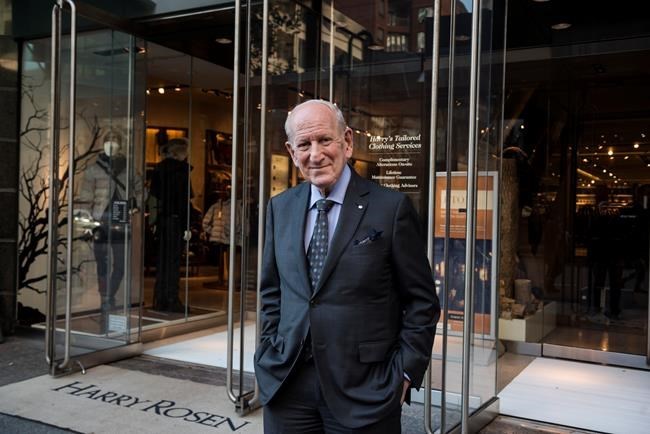
Canadian menswear titan Harry Rosen poses for a portrait in front of his Bloor Street store on Wednesday, October 19, 2016 in Toronto. THE CANADIAN PRESS/Christopher Katsarov
Republished October 20, 2016 - 1:17 PM
Original Publication Date October 20, 2016 - 12:35 PM
TORONTO - Menswear giant Harry Rosen is supposed to be retired.
But on a recent weekday afternoon, he's found in his 16th floor Bloor Street office, surrounded by files for the various causes he fundraises for.
The Toronto-bred entrepreneur no longer runs the day-to-day operations of his nationwide chain of stores, but he still does some consulting for U.S. and European businesses and keeps his eyes peeled for what's next in the world of style and design.
"I'm 85 but somehow or other I don't feel it," Rosen says while seated in front of a picture window overlooking his flagship store.
"I'm wide open to new ideas. When I go somewhere with my wife, I usually am looking at the stores and looking at what people are wearing and if I can, I try to get to meet the merchants, establish what we have in common and learn something from them.
"I shouldn't be doing that because I'm 85 and I'm supposed to be retiring."
Rosen, who founded his namesake company in 1954, credits that thirst for knowledge with fuelling his career, which is being recognized Monday by Fashion Group International's Toronto chapter.
"I'm particularly honoured because it's an international organization made up of a variety of retailers," says Rosen, who is getting the group's fourth annual fashion visionary award.
"People don't usually recognize people in the menswear business, which has been 62 years of my life, so I'm glad for the recognition."
Rosen says he got his first taste for merchandising as a teen working in the junkyard his father ran in the northern Ontario community of Callandar.
"I sorted out all the merchandise — cast iron here, horse hair here, shirts here," he chuckles.
It turns out he was a bit of a troublemaker, too. At age 14 he accidentally burnt all the hair off his body while playing with fire.
"I tried to burn copper wire in a barrel and poured kerosene on it and it jumped up the spout into the can and all over me. I ran and I don't know how I got out of my shirt but I did, I rolled on the ground and I walked around like this for a little while," Rosen says, holding his arms out from his sides.
Less than 10 years later he'd be running his first shop — a thinly stocked store furnished with used plastic shelves and a hand-cranked cash register.
Rosen says he was driven by a desire to connect with his customers, and earn their loyalty.
"I pioneered keeping a record of my customer — their names, what business they were in, the size of their family, their hobbies and activities and peer groups and so on. And also clippings of any fabric that I sold them so I always had on hand what was in their wardrobe. And that turned out to be a very valuable way of building a reputation."
He boasts of introducing Canada to collections by Ermenegildo Zegna, Hugo Boss and Brioni and redefining how Canadian men dressed. His office is decorated with old newspaper ads, framed photos of friends and family, as well as celebrity patrons including Christopher Plummer, Norman Jewison and the late Al Waxman.
Today, tailored apparel has dropped to about half of the chain's sales, although formal wear has "never been stronger," Rosen insists.
There's an appetite for luxury brands, he says, pointing to the rapid influx of big U.S. brands Nordstrom and Saks Fifth Avenue.
"And I know that Neiman Marcus has been scouting this market. I predicted this would all happen," he says.
"We acted in operating our business like they were here already ... and that's worked pretty well."
News from © The Canadian Press, 2016